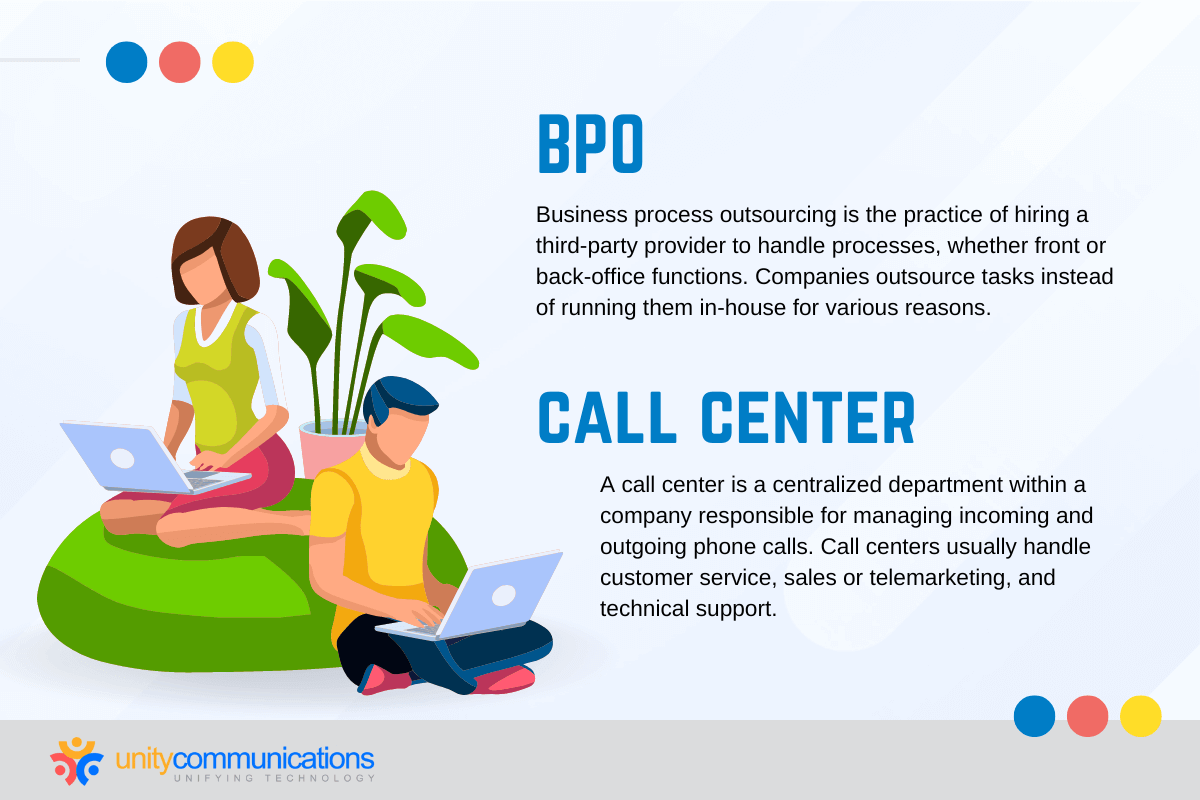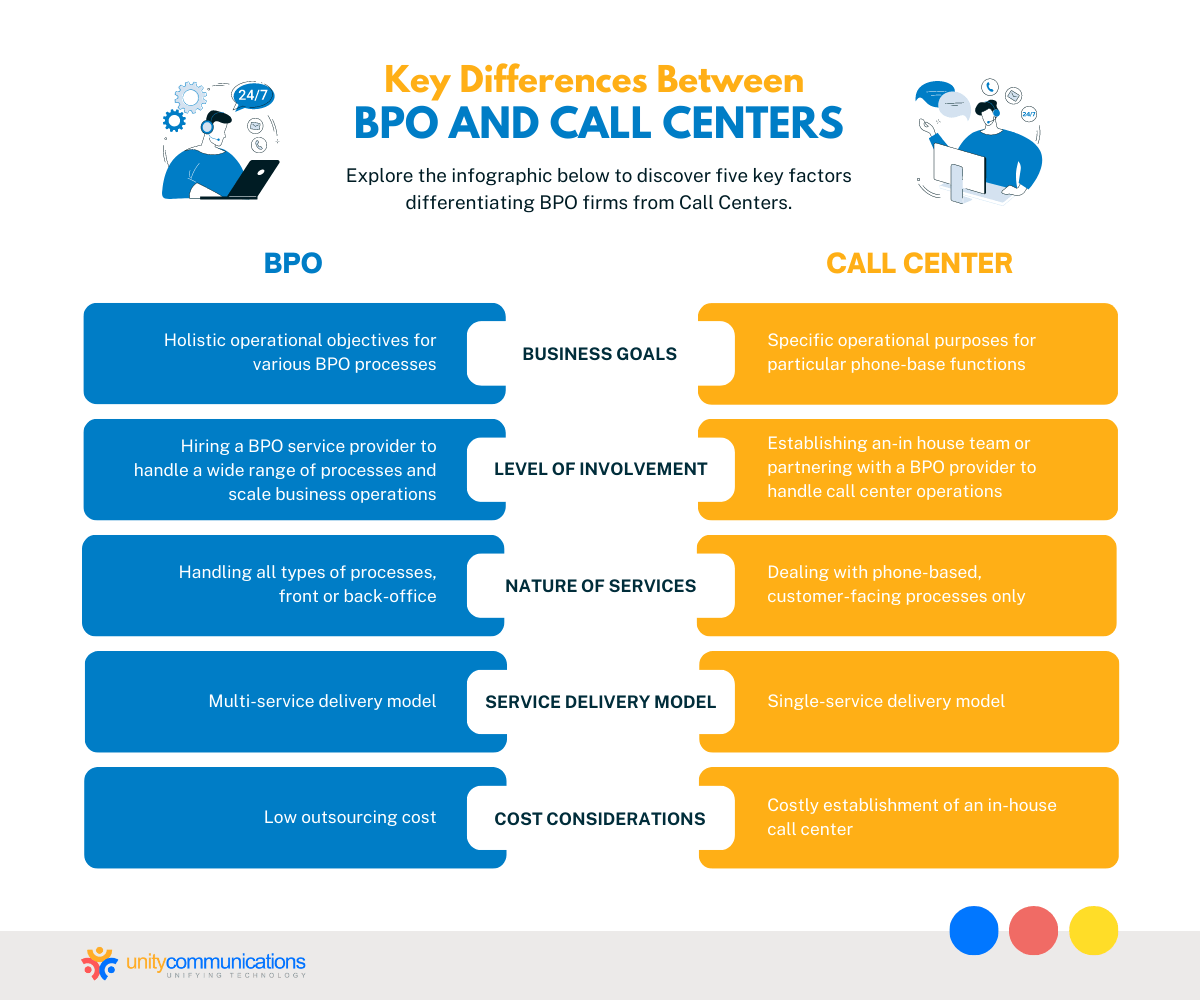IN THIS ARTICLE
Table of Contents
Business process outsourcing (BPO) has long been a viable solution for scaling operations and reducing costs. The term “BPO” instantly conjures images of call center agents assisting customers on the other side of the globe.
However, are BPO companies and call centers the same? The answer is… not necessarily!
This article explores the difference between BPO and call centers to help you make informed outsourcing decisions.
BPO vs. Call Centers: The Main Difference

To know the primary difference between BPO and call centers, ask what BPO is and what call centers are. Understand their definitions:
- Business process outsourcing. BPO is the practice of hiring a third-party provider to handle processes, whether front or back-office functions. Companies outsource tasks instead of running them in-house for various reasons. They aim to cut costs, focus on core operations, streamline processes, and grow their businesses.
- Call center. A call center is a centralized department within a company responsible for managing incoming and outgoing phone calls. Call centers usually handle customer service, sales or telemarketing, and technical support. However, businesses can outsource their call center operations to BPO providers.
The Key Differences Between BPO and Call Centers
Based on the definitions above, BPO and call centers are two different terms. However, they are somehow relevant to each other since an outsourced call center is a subset of BPO.
That said, it helps to ask what a BPO call center is. This type of call center is a third-party provider specifically handling phone-based processes such as customer service, sales, and the help desk.
To dig in further, take a look at the table below.
| Key Difference | BPO | Call Center |
|---|---|---|
| Business Goals | Holistic operational objectives for various BPO processes | Specific operational purposes for particular phone-based functions |
| Level of Involvement | Hiring a BPO service provider to handle a wide range of processes and scale business operations | Establishing an in-house team or partnering with a BPO provider to handle call center operations |
| Nature of Services | Handling all types of processes, front or back-office | Dealing with phone-based, customer-facing processes only |
| Service Delivery Model | Multi-service delivery model | Single-service delivery model |
| Cost Considerations | Low outsourcing cost | Costly establishment of an in-house call center |
Let us expound on each of them.
1. Business Goals
A fundamental divergence between BPO and call centers lies in their underlying purposes. What precisely are your aspirations when it comes to outsourcing to a BPO partner? What goals underpin your decision to establish or entrust a call center function to a BPO provider?
Businesses collaborating with BPO firms typically harbor comprehensive operational aims, which encompass:
- Core business emphasis. You can shift your primary focus towards core competencies by delegating non-core functions to an external provider.
- Cost reduction. The objective is to curtail operating and labor costs through offshore outsourcing.
- Augmented efficiency. The pursuit involves gaining access to expertise and advanced technology to enhance operational efficiency.
- Enhanced quality. The aim is to establish a quality assurance (QA) team dedicated to ensuring service excellence and compliance with business standards.
- Elevated customer satisfaction (CSAT). The goal is to harness modern tools and adept professionals to elevate the customer experience and drive higher CSAT scores.
- Long-term expansion and growth. Seek a reputable BPO partner capable of facilitating the growth and expansion of your startup or small business.
In contrast, a call center possesses specific objectives tailored to distinct functions, such as:
- Elevated CSAT. The objective is to elevate the efficiency of customer service operations, whether by establishing an in-house call center or engaging a BPO call center.
- Enhanced reach and revenue. The aim is to establish an in-house or BPO sales team, extending reach and bolstering sales figures.
- Amplified payment collections. The plan involves forming a dedicated billing and collections team to secure customer payments and propel revenue growth.
2. Level of Involvement
The level of involvement is another difference between BPOs and call centers. BPO involves two companies working together towards common business goals. A call center can be in-house or outsourced. Take note of the following:
- BPO. An SME or big company hires a third party to handle some of its processes, whether front-office or back-end functions. In short, BPO involves two businesses and covers a wide range of services. The global BPO market could grow from $0.39 trillion in 2024 to $0.44 trillion by 2028.
- Call Center. A business can establish an in-house call center for its customer-facing operations. However, it can work with a BPO call center to access a customer-centric workforce, advanced technology, and ample resources. The global call center market revenue was worth $27.1 billion in 2022 and was projected to hit $55.5 billion by 2029.
3. Nature of Services
One must consider the services they offer to understand the difference between BPO and call centers.
A BPO firm usually handles all processes:
- Front-office Functions. A BPO company manages inbound and outbound calls and handles customer-facing tasks such as customer service, sales, and tech support. It is not limited to phone calls but offers email and live chat support.
- Back-office Functions. A BPO firm does not only tackle front-office processes; it also covers administrative tasks, such as accounting and finance (A&F), human resources (HR), and information technology (IT) support. It provides business support, such as data entry and inventory management in e-commerce.
A call center deals with phone-based, customer-facing processes.
- Inbound Calls. A perfect illustration of a business function that a call center typically handles is customer service. Representatives receive customer calls, answer questions, process requests, and resolve issues.
- Outbound Calls. An outbound call center is responsible for handling business processes like sales and telemarketing. Salespeople reach out to prospective leads to promote their businesses and sell products or services.
4. Service Delivery Model
You should look at their service delivery models to further understand the difference between BPO and call centers.
A BPO has a multi-service delivery model, while a BPO call center often has a single-delivery model. Take note of the following:
- BPO. A BPO company typically serves various clients with different accounts or departments. A particular business can outsource multiple business functions to a single firm. For example, you can entrust your call center operation to a BPO provider, alongside back-office and administrative work.
- Call Center. A call center only covers phone-based operations for customer-facing processes. For example, you can hire a BPO call center to handle your customer service operations. Sometimes, you can also allow it to manage your sales and technical support.
5. Cost Considerations
Discussing costs helps businesses understand the difference between BPOs and call centers. Establishing an in-house call center can be expensive while hiring a BPO service provider can be cost-effective.
In fact, Deloitte identifies cost reduction as the top outsourcing reason for most businesses. Let us expound on the difference below.
- BPO. Hiring a BPO vendor allows you to save money long-term. According to Outsource Accelerator, it cuts your operating expenses and labor costs by up to 70%. You need not spend on building infrastructure, investing in technology, and hiring employees.
- Call Center. Building a call center from the get-go is expensive. You must set aside a capital outlay for infrastructure, telecommunications systems, recruitment, and training. That is why most companies choose to outsource their call center operations. With numerous BPO call center jobs available, you have access to a vast talent pool, not to mention technology.
The Bottom Line

Now that you’ve learned the difference between BPO and call centers, BPO involves hiring a third-party provider to handle your front- and back-office processes. Meanwhile, a call center entails tackling phone-based, customer-facing functions.
You can build an in-house call center or outsource it to a BPO service provider. The latter is a feasible option for accessing talent, technology, and resources. Ultimately, the right BPO partner will help optimize your call center operations for business growth and success!
Looking for a call center or BPO service provider? Unity Communications offers outsourcing services to businesses of all sizes. We can help build your call center operations and handle your back-office functions. So what are you waiting for? If you are ready to outsource, let’s connect!





